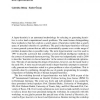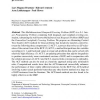163
Voted
CHI
2010
ACM
14 years 11 months ago
2010
ACM
Teaching is inherently a social interaction between teacher and student. Despite this knowledge, many educational tools, such as vocabulary training programs, still model the inte...
138
click to vote
ACMDIS
2010
ACM
14 years 11 months ago
2010
ACM
People are ready to change themselves to adopt more ecofriendly habits such as conserving electricity when they are aware of the possible problems of their lifestyle. In this sens...
155
Voted
ACHI
2010
IEEE
14 years 11 months ago
2010
IEEE
In the field of Human-Robot Interaction (HRI), a novel experimental methodology is presented for carrying out studies which uses a theatrical presentation with an actor interacting...
158
Voted
HUC
2010
Springer
14 years 12 months ago
2010
Springer
Consumer game platforms are realizing Ubicomp's vision of seamless, sensor-based, embodied interaction with computation. Here we present Propinquity, a full-body dancing/figh...
83
Voted
HEURISTICS
2010
14 years 12 months ago
2010
90
Voted
HEURISTICS
2010
14 years 12 months ago
2010
160
Voted
HEURISTICS
2010
14 years 12 months ago
2010
The urban transit routing problem (UTRP) is NP-Hard and involves devising routes for public transport systems. It is a highly complex multiply constrained problem and the evaluati...
97
Voted
HEURISTICS
2010
14 years 12 months ago
2010
94
Voted
HEURISTICS
2010
14 years 12 months ago
2010
125
Voted
HEURISTICS
2010
14 years 12 months ago
2010
This paper investigates an adaptive constructive method for solving nurse rostering problems. The constraints considered in the problems are categorised into three classes: those t...



